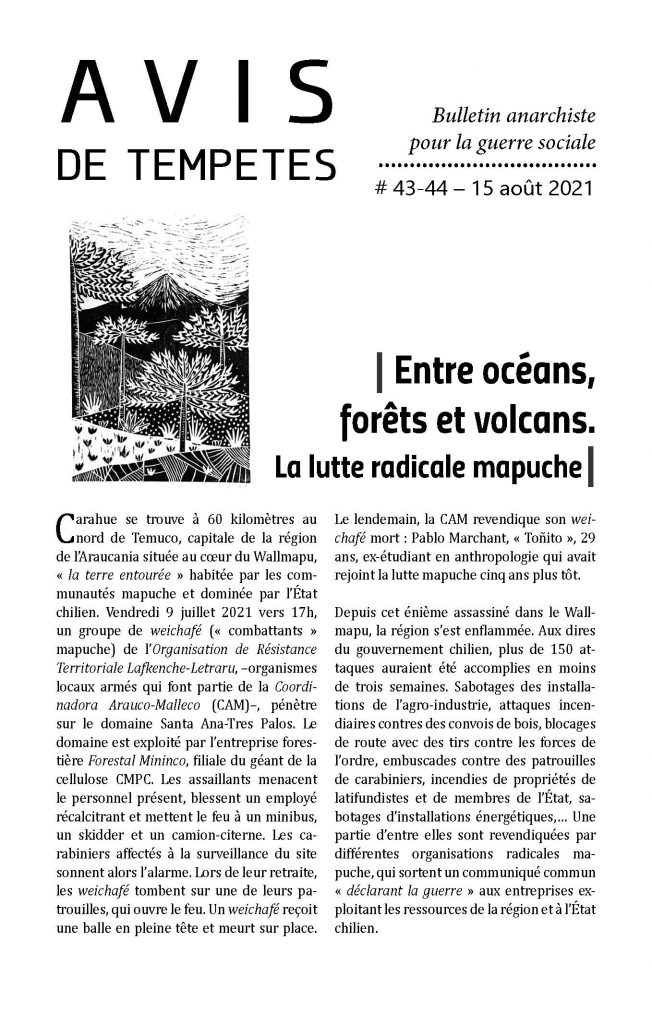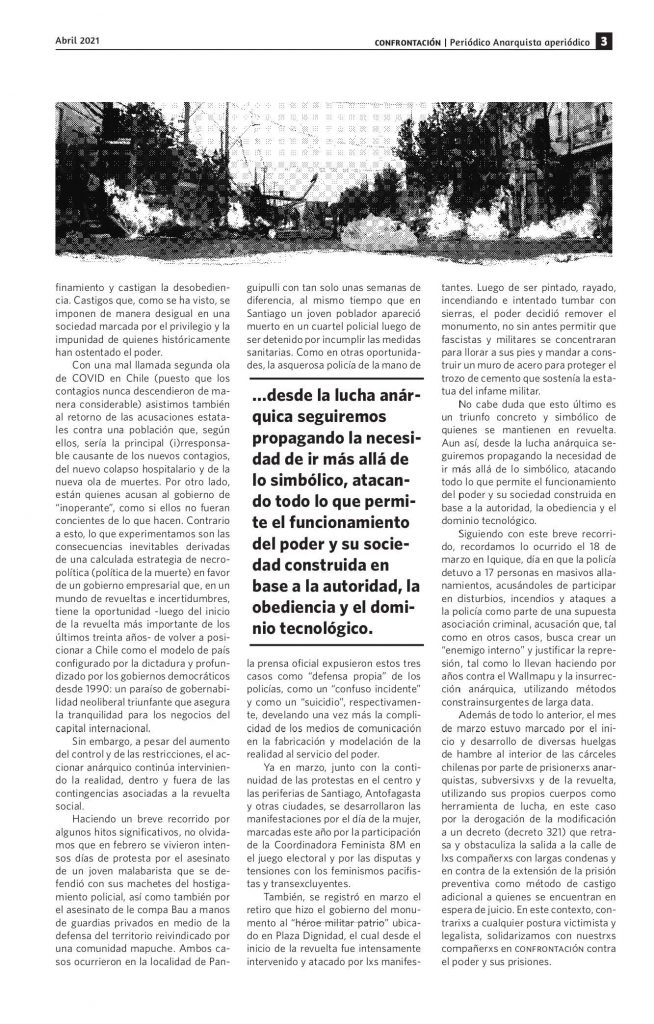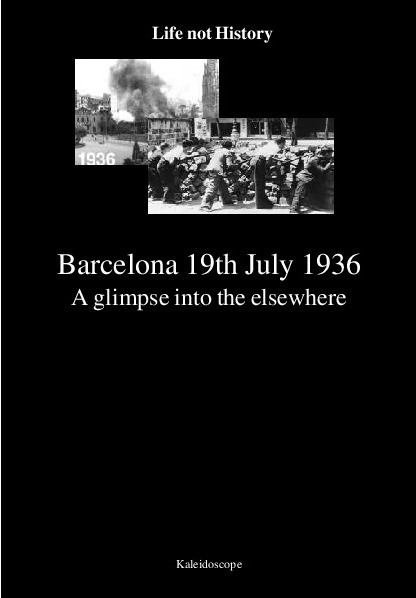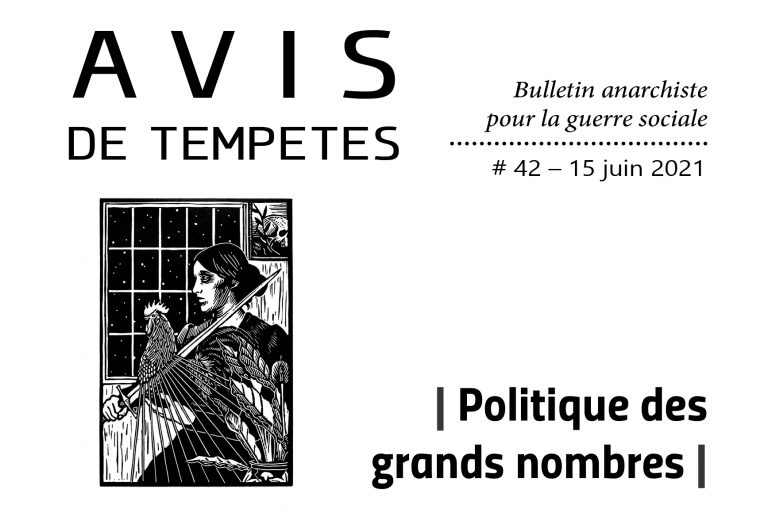Category Archives: Library
PDF,EN: Issue 7 / Year 3 / April 2021 CONFRONTACIÓN Irregular anarchist publication / Chilean region
Avis de tempêtes #43-44
Avis de tempêtes – bulletin anarchiste pour la guerre sociale n°43-44 (juillet-août 2021) est sorti. Pour lire, imprimer et diffuser ce petit bulletin autour de soi (il est en format A5, et celui-ci fait 24 pages), on pourra retrouver chaque nouveau numéro tous les 15 du mois, ainsi que les précédents, sur le blog :
https://avisdetempetes.noblogs.org
“A l’heure où dans le monde entier, les conséquences de l’avancée folle de la machine industrielle et technologique se font ressentir chaque jour davantage, où les changements climatiques induits par
l’industrialisation pourraient bien inaugurer des scénarios inouïs qui risquent de reconfigurer drastiquement les assises de la domination, la lutte mapuche dans un coin « perdu » du monde où des habitants et habitantes porteurs de façons de vivre antagonistes avec le capitalisme et l’étatisme se battent pour chaque mètre accaparé et exploité par des entreprises et l’État, peut avoir une signification qui dépasse le territoire du Wallmapu.
EN: Issue 7 / Year 3 / April 2021 CONFRONTACIÓN Irregular anarchist publication / Chilean region
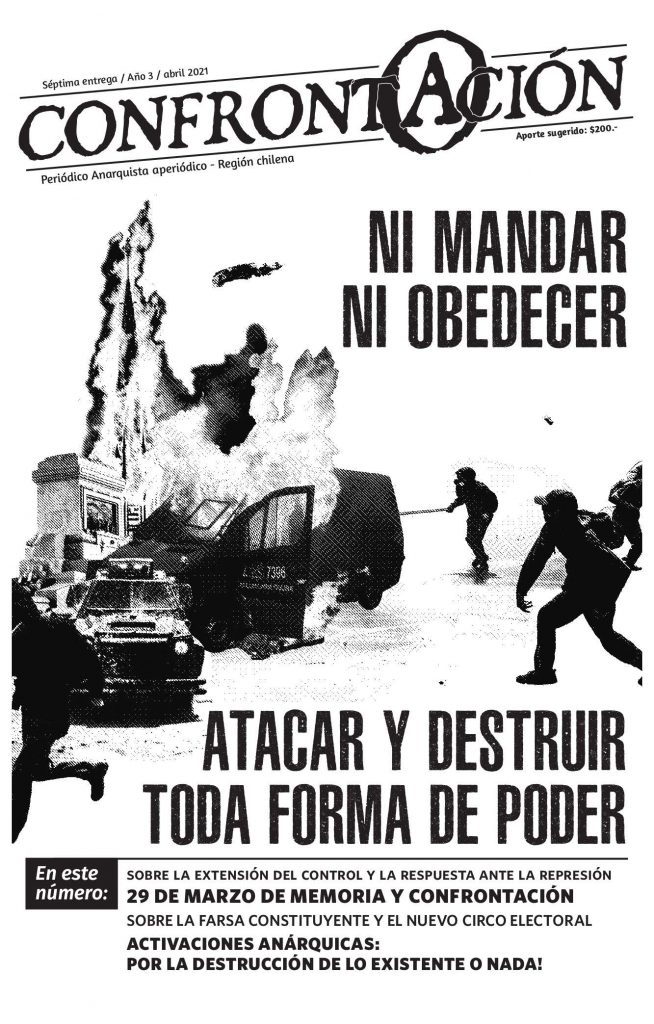 ES: PDF
ES: PDF
NEITHER COMMAND NOR OBEY
ATTACK AND DESTROY ALL FORMS OF POWER
In this issue:
About the Extension of Control and the Response to Repression
March 29th of Memory and Confrontation
About the Constitutional Farce and the New Electoral Circus
Anarchist Activations: For the Destruction of The Existent or Nothing
Translated by Act For Freedom Now!
——-
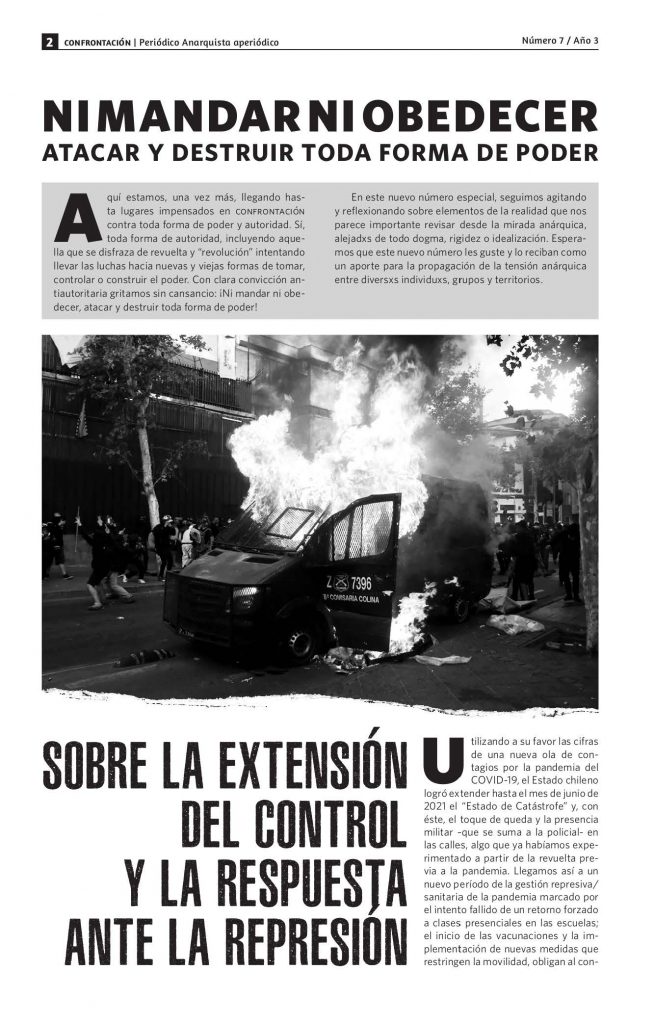
NEITHER COMMAND NOR OBEY
ATTACK AND DESTROY ALL FORMS OF POWER
Here we are, once again, reaching unthinkable places in CONFRONTATION against all forms of power and authority. Yes, all forms of authority, including that which disguises itself as revolt and “revolution” trying to bring the struggles toward new and old ways of taking, controlling or constructing power. With clear anti-authoritarian conviction we tirelessly shout: neither command nor obey! Attack and destroy all forms of power!
In this new special issue, we continue agitating against and reflecting on elements of reality that we feel are important to view from an anarchist perspective, far from all dogma, rigidity or idealization. We hope that you like this new issue and that you receive it as a contribution to the propagation of the anarchist tension among diverse individuals, groups and territories.
ABOUT THE EXTENTION OF CONTROL AND THE RESPONSE TO THE REPRESSION
Using the statistics from a new wave of cases in the COVID-19 pandemic to their advantage, the Chilean state managed to extend the “State of Catastrophe” into the month of June 2021. With this, the curfew and military presence – on top of the police presence – remain in the streets, something that we already experienced throughout the previous uprising and the pandemic. And so we arrive at a new period of repressive and sanitary management of the pandemic marked by the failed attempt to force schools to restart in-person classes, the start of vaccinations and the implementation of measures which restrict mobility, oblige confinement and punish disobedience. Punishments which, as we have seen, are imposed unequally in a society marked by privilege and the impunity of those who have historically held power.
Continue reading EN: Issue 7 / Year 3 / April 2021 CONFRONTACIÓN Irregular anarchist publication / Chilean region
New Issue of Anathema Volume 7 Issue 5 ( usa)

Volume 7 Issue 5
Volume 7 Issue 5 (PDF for reading 8.5×11)
Volume 7 Issue 5 (PDF for printing 11×17)
In the issue:
- What Went Down
- Hunger Strikes
- Chilean Models
- On Noise Demos
- Brooklyn Center Riot Interview
- Ecodefense Roundup
- Everything Will Go
- Progressives Refund Police
- Fires At Ford For Floyd Uprising
anathema.noblogs.org
WHAT’S HAPPENING IN CUBA? AN ANARCHIC LOOK AT THE 11-J PROTESTS.
ES: ¿QUÉ PASA EN CUBA? UNA MIRADA ANÁRQUICA DE LAS PROTESTAS DEL 11-J.
——————–
-Interview with comrade Gustavo Rodríguez (First of three parts)
These days we have received a torrent of statements generated in the mass disinformation media about the recent protests in Cuba. On the one hand, there are those formulated by the Cuban officialdom and the leftists of the world in the name of anti-imperialism and in defense of what they still call the «Cuban revolution», on the other hand, there are the traditional right-wing media that accuse the «communist dictatorship» of the lack of freedoms and rights.
The Cuban Communist Party and its international acolytes call for solidarity with the regime, arguing that they are facing a new intervention of «Yankee imperialism» which is taking advantage of the disastrous economic conditions caused by more than sixty years of blockade and the greatest health crisis in its history. While the supporters of the free market and the right-wing forces claim that what is happening in the country is the result of its citizens’ oppression due to the lack of opportunities in the socialist regimes.
In these times of post-truth we are suspicious of all these positions, but also, as anarchists, we are not only suspicious of these channels of manipulation but we identify positions that are contrary to our praxis and enemies of our desire for total liberation.
Continue reading WHAT’S HAPPENING IN CUBA? AN ANARCHIC LOOK AT THE 11-J PROTESTS.
AGAINST THE TIDE – GUSTAVO RODRÍGUEZ
-The dilemmas of the contemporary «anarchist movement» versus the instituting character of the «social movements.»1.
«Vulgarly it is held that the «great mass» could not remain without religion; the communists extend that claim.»
Max Stirner, My Enjoyment of Myself, in The Only One and His Property.
«To see what we have in front of our noses requires a constant struggle.»
George Orwell, In front of your nose.
Contrary to what all the verbal diarrhea of post-modern neo-Leninism claims about the so-called «social movements», the novelty of these movements does not lie in the replacement of trade unions and traditional political parties, but in the motivational structure of the subjects involved; That is, in the convergence of perceptions around multiple factors (economic-socio-cultural) that nourish the collective longing for the welfare state and the labor society and, through processes of social mobilization, constitute a new institutional force that serves as a platform for the different fascisms -whether black, brown, red or whatever color they are given in order to persuade the «masses»- and paves the way for populist leaders.
Meanwhile, the social scientists (neo-Marxians and/or proto-populists) juggle a thousand and one times to semantically accommodate «institutionalization», giving the concept a one hundred and eighty degree turn so that it is grammatically instrumental for them; that is, hiding the intentions of co-optation of the struggles and forced integration to the «new» domination. Continue reading AGAINST THE TIDE – GUSTAVO RODRÍGUEZ
Barcelona 19th July 1936 A glimpse into the elsewhere
A glimpse into the elsewhere of an upturning so great that it is unimaginable, where certainties are swept away in an instant and life itself takes on a fragile intensity.
These accounts contain a grain of everything it is possible to foresee of the ultimate fight for freedom and other aspects that could never have been dreamt in our worst nightmares.
They inform, inspire but also warn: we need to recognise the enemies of freedom and self organisation in the paths we tread, blinded by our iconography of the enemy which is also standing right next to us and calls us comrade, albeit hissed through clenched teeth.
With love in our hearts.
elephanteditions
The ‘Rage Against Video Surveillance’ zine 2020-21 ( France)
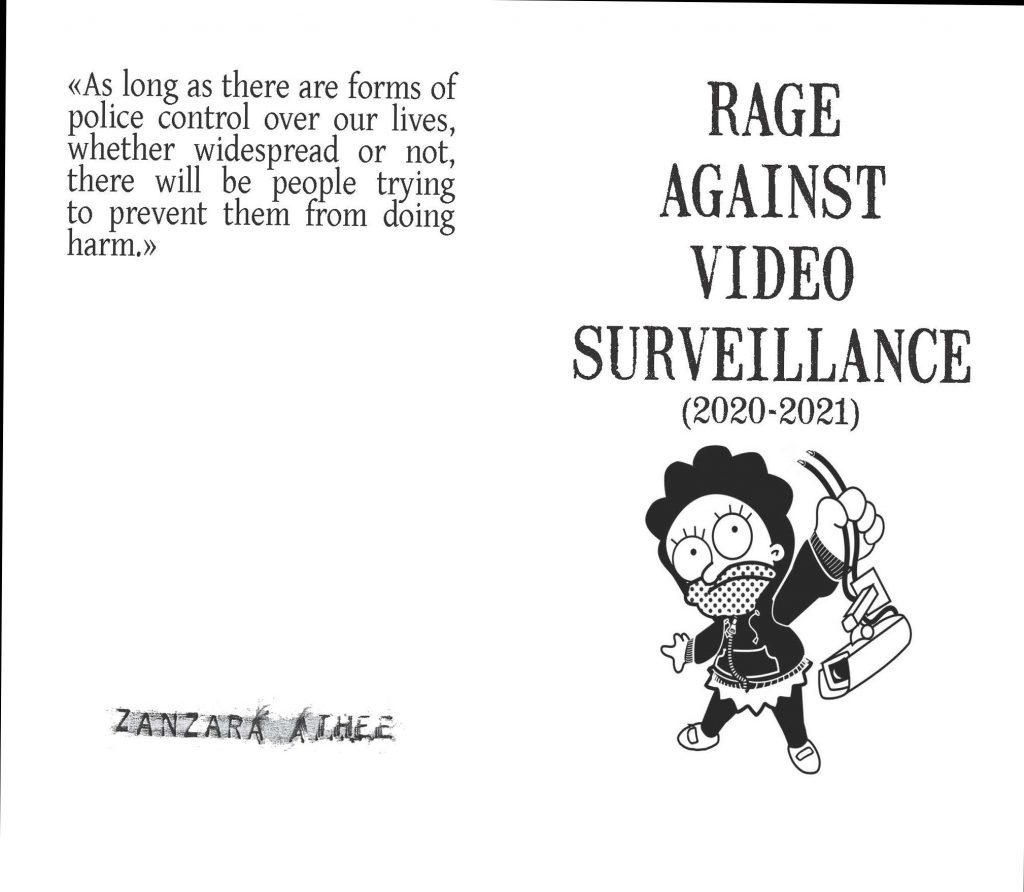 pdf read : ‘Rage Against Video Surveillance’
pdf read : ‘Rage Against Video Surveillance’
pdf print: ‘Rage-against-video-surveillance’
Translated from French by an anarchist comrade
for Act For Freedom Now!
July 2021
Booklet pdf: Targets that exist everywhere – a strategic proposal for building a common front against the profiteers of war and repression
 PDF
PDF
Targets that exist everywhere – a strategic proposal for building a common front against the profiteers of war and repression Rapidly, time marches on; we are already in the 2nd year of the Covid-19 state of emergency and, knowing that no power will ever voluntarily relinquish its new mechanisms of control, anarchist and other libertarian movements all over the globe are looking for strategies and practical means against it. In some regions, social tensions have recently erupted into riots.
Elsewhere, there are short-lived outbreaks known as Corona Riots. As anarchists, we are often surprised by the dynamics, sometimes finding ourselves in the crowd of the street battles or perplexed as spectators on the sidelines. Almost every state deals with us, small groups or individuals, sabotaging, agitating and roaming restless in the cities.
ES: Publicación REBELIÓN N 17
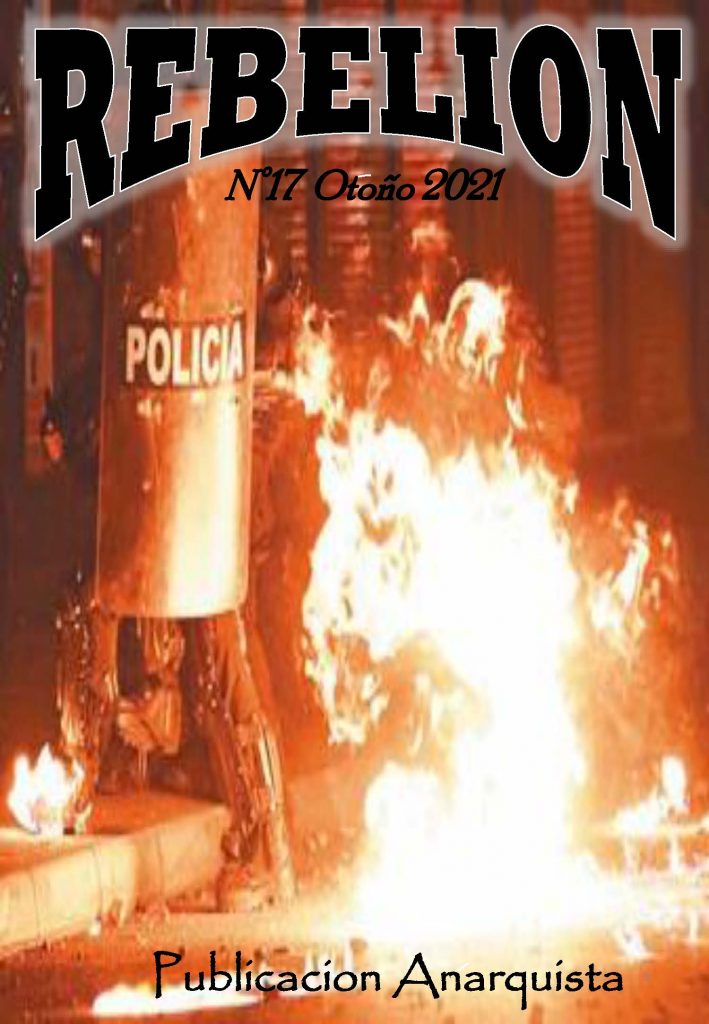
A MODO EDITORIAL
El tiempo pasa y la autoridad permanece, de ahí mismo, surge otro virus en la tierra. Contra ésto, una nueva rebelión es inminente.
Compartir un nuevo momento entre compañerxs a la distancia, es un placer. Pasar de la última edición en la que el mundo entero ardía en protestas y la elite temblaba, al nuevo genocidio de un virus mortal, junto con él de los gobiernos, el capitalismo y el sistema carcelario que siguen intactos. Representa el claro ejemplo, que la autoridad avanza a pasos agigantados.
Mediante su abance, millones de pobres más, millones de ricxs más ricxs y en el medio, millones de muertxs con cada pisada. Para no parecer menos, la policía hizo lo suyo también, matando a Facundo Castro, a cientos más en nombre de la ley y luego victimizandoce (huelga show) por un salario digno. Matando a Ursula Bahillo para luego abogar hipócritamente contra los femicidios de sus propios compañeros y los de ésta sociedad patriarcal-policial. Emilia fue asesinada de un balazo en la frente, por otro sicario del poder. Tehuel sigue sin aparecer y la Iglesia y su moral siguen demostrando lo genocidias que siempre fueron, con el grito de mil niñxs aborígenes torturadxs y enterradxs en fosas common bajo sus templos. Mientras tanto, se idiotiza toda una la sociedad entera undida en deudas y enfermedad con el circo sin pan, con
el patriotismo-popular de otra copa América. Demostrando nuevamente que toda la religión, Capital y Estado son misántropos desde sus orígenes.
Y como buenos justicierxs de burgueses, reprimieron en desalojos de tierras y casas, en protestas, defendiendo el capital a capa y espada, torturando, matando o encarcelando a todxs lxs que atenten contra lo establecido. Sicarios de lxs que generan miserias. Esclavos miserables, que protegen a sus amos y sus intereses …

Burning the centers of the technological virus On the necessity of cutting the networks of domination
Italy: Number 6 of the anarchist newspaper Vetriolo has come out IT/EN
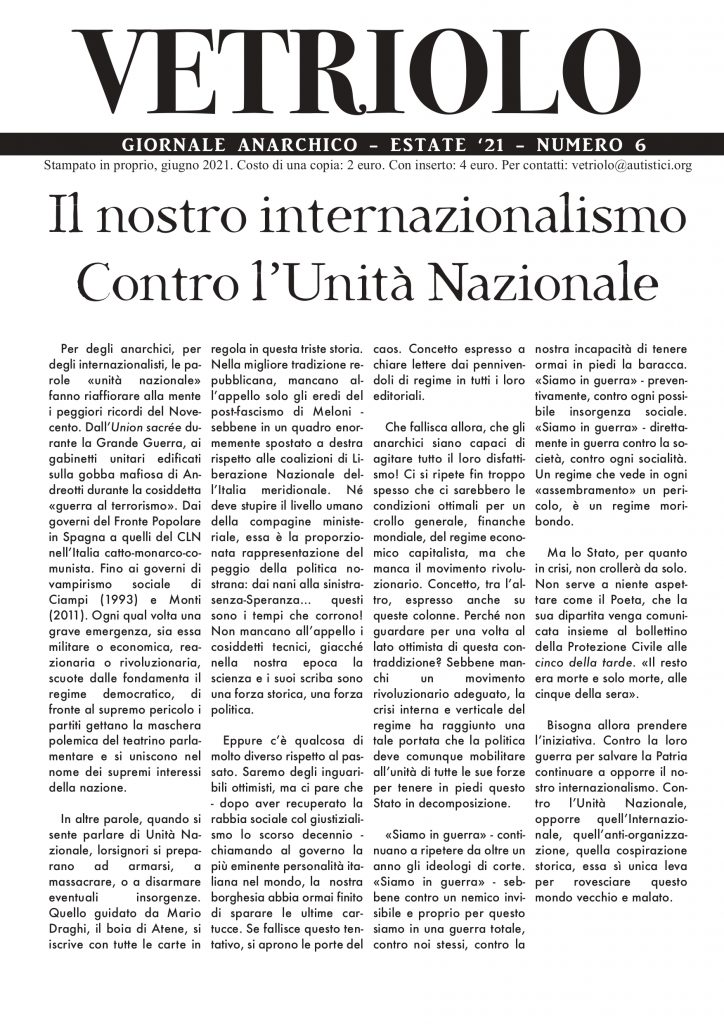 Our seventh issue (including issue #0) sees these columns return, in many ways, to our classic format. Nine months ago, the unprecedented release in the form of a wall-newspaper (issue 5) was part of our need for communication and a proposal for an instrument to break, materially, the pandemic home isolation; a sheet of paper, a cry on the wall to pierce the silence of the curfew. But the project of “Vetriolo” has always been in a laborious sowing of analysis and provocations, suggestions and insights, the study and understanding of the existing, against the commonplace and the foolish boast of ignorance, in order to its negation, its destructive overcoming in a revolutionary sense.
Our seventh issue (including issue #0) sees these columns return, in many ways, to our classic format. Nine months ago, the unprecedented release in the form of a wall-newspaper (issue 5) was part of our need for communication and a proposal for an instrument to break, materially, the pandemic home isolation; a sheet of paper, a cry on the wall to pierce the silence of the curfew. But the project of “Vetriolo” has always been in a laborious sowing of analysis and provocations, suggestions and insights, the study and understanding of the existing, against the commonplace and the foolish boast of ignorance, in order to its negation, its destructive overcoming in a revolutionary sense.
And so we have returned to dealing with history and philosophy, economics and politics, analysis of the present and dissection of the future. Starting from our first page, which wants to be, in its brevity, an immediate attack to the politics of National Unity – a horrible concept for internationalists.
Continue reading Italy: Number 6 of the anarchist newspaper Vetriolo has come out IT/EN


